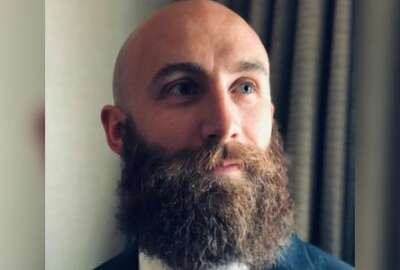

A veterans group has teamed up with the Cybersecurity and Infrastructure Security Agency to help a particularly vulnerable group of veterans identify disinformation...
Best listening experience is on Chrome, Firefox or Safari. Subscribe to Federal Drive’s daily audio interviews on Apple Podcasts or PodcastOne.
Foreign mischief makers and hackers have long targeted U.S. veterans for online scams and false information. Now one veterans group has teamed up with the Cybersecurity and Infrastructure Security Agency. The goal is to help a particularly vulnerable group of veterans identify disinformation and stop its spread. For details, Federal Drive with Tom Temin turned to the president of High Ground Veterans Advocacy Kristofer Goldsmith.
Interview transcript:
Tom Temin: Mr. Goldsmith, good to have you on.
Kristofer Goldsmith: Thanks for having me.
Tom Temin: And we should say that the group that we’re talking about is Vietnam Veterans of America, which you were formerly associated with, is the one with the arrangement with CISA. Tell us about this deal with CISA.
Kristofer Goldsmith: This partnership between Vietnam Veterans America and CISA was a long time coming. In September of 2019, I published a report for Vietnam Veterans America, at the time I was there associate director for policy and government affairs and their chief investigator. And I had spent two years investigating all of the different ways that foreign adversaries are targeting troops, veterans and our families online. And that can range from anything from the direct targeting of Vietnam Veterans American, other congressionally chartered veteran service organizations by the Russian IRA, the internet research agency, to things like identity theft and impersonation to commit romance scams using service members as the bait. Unfortunately, after we published the report last year, we being VVA, when I was with him, we waited for federal response, and that didn’t come for months and months and months. And finally, early in 2020 after quite a bit of a public pressure campaign, CISA reached out to us and said, hey we’d like to do something here.
Tom Temin: Tell us a little bit more about the types of scams that are aimed and why Vietnam veterans, why would they be targeted especially? Because I think most Americans feel like we’re all getting inundated with spam and so on and phishing attacks.
Kristofer Goldsmith: Yeah. So Vietnam veterans represent two constituencies that are much more likely to participate in democracy than their civilian cohorts. One is, their older Americans who are voting at a higher rate, and two they’re veterans who are voting at a higher rate. And veterans are also more likely to influence the voting behavior and belief systems of those around them. They’re social influencers in the pre-social media sense. If you can change the mind or vote of Vietnam vet, there’s a good chance that you’re gonna bring a family and group of friends with.
Tom Temin: So they’re last of the boomer warriors, you might say?
Kristofer Goldsmith: Correct. And Vietnam Veterans America, while, I don’t think that anyone would expect that to be the veterans group who gets into the issue of cybersecurity, it was because they had a millennial, me, working for them at the time, who noticed two years ago that there was an imposter online organization. Something that was being the millennial working for Vietnam Veterans America, I came to notice that there was an imposter virtual organization that was using our trademark name, our congressionally chartered veteran service organizations logo, and using it to not just build a tremendous audience of veterans and military families, but also to push divisive and false narratives.
Tom Temin: Got it. You made this apparent in a report and then kind of hammered on the federal government to do something about it. So it wasn’t a Veterans Affairs Department, but CISA part of Homeland Security that responded. How did they respond to you?
Kristofer Goldsmith: Correct. So while working for Vietnam Veterans, America, we published this 200 page report. It was covered by your network and virtually every major network out there. And yet, we got crickets from the executive branch all around. The VA said that they were going to respond. It’s been over a year, the VA has had no response. Finally, it was CISA who reached out to Vietnam Veterans Americans and said, hey let’s form a partnership here. We want to help to defend veterans against foreign online interference, and we jumped at the opportunity.
Tom Temin: And what was the nature of the misinformation? Was it political advocacy or trying to get people to vote a certain way? You mentioned earlier romance types of scams. That would be foreign brides and that kind of thing?
Kristofer Goldsmith: Yeah, so so the first thing that we found was this imposter Vietnam vets organization, and Vietnam Veterans America as soon as I discovered that decided, okay we’re gonna create a new position for you. You’re now the first chief investigator of any Veterans organization ever, right. And they basically just gave me a long leash and told me go find all the bad stuff and come back to us. So it took two years, but I found everything from, and this is just using Open Source Intelligence. So literally getting on Facebook, getting on Twitter and just doing searches, looking for what’s publicly available and then connecting it with other publicly known information. For example, I think that few of your listeners probably remember this, but there was a point in 2016 when ISIS was reportedly sending threats to military families. Well, it turned out that it was actually the Russian IRA pretending to be ISIS sending threats to military families. Now, these reports came out months apart, and each individual military family was going to their hometown newspaper or the newspaper that they were most associated with, but taking it in the aggregate, I realized that oh okay this wasn’t just Russians targeting military families. This was Russians targeting prominent military activists, advocates, and people who worked for news outlets like military.com. So in the aggregate, we found hundreds of Facebook pages, groups and accounts, with collectively many, many millions of members and followers. And part of the really devious and smart thing was that not everything was the divisive rhetoric that we have come to expect. A lot of it was semi useful or benign stuff like information about VA home loans. But every once in a while, knowing their target group, they would drop in an old story about Jane Fonda meeting with the North Vietnamese, which 50 years later still gets a lot of Vietnam vets really riled up. So it wasn’t just about influencing people and getting them to vote in one way. It was about the disruption of our democracy, the creation of division, and the selling of mistrust, and of frankly, hatred when they promoted things like racism and xenophobia.
Tom Temin: So what does the agreement with CISA entail? What is CISA going to do about this? Sounds like a pretty sophisticated program, the IRA launch?
Kristofer Goldsmith: Yeah, the program with CISA was very slow. The pandemic definitely slowed down everything, both in the government and nonprofit sector. Again, my job with Vietnam Veterans, America was a casualty of the pandemic, which is why I’m now on my own. But the campaign is called protect 2020, using the hashtag protect 2020. And the main goal is to make veterans and their families more resistant to disinformation campaigns. Now, how do you build up a resistance, it comes down to media literacy, and things like, when you see something outrageous, maybe you should be suspicious, you should check from verified resources. Think before you share, think before you retweet. And those may sound like simplistic messages, but really a lot of disinformation can be solved with simple things just like that, like building just a little bit of resistance before you amplify.
Tom Temin: Yeah, this is the generation that typically is quick to forward the church newsletter jokes and that kind of thing. So have that kind of 1995 forward this mentality, I guess maybe because of the boomer age. And so any results yet at this point?
Kristofer Goldsmith: So unfortunately, the campaign launched far too late to have an effect pre-election. It launched just a week before we were voting,
Tom Temin: And the 2024 campaign will start in about two weeks anyway, so we’ll be right back in it. Kristopher Goldsmith is president of high ground veterans advocacy, and formerly with Vietnam Veterans of America. Thanks so much for joining me.
Kristofer Goldsmith: Thank you. It was great to be on with you.
Copyright © 2025 Federal News Network. All rights reserved. This website is not intended for users located within the European Economic Area.
Tom Temin is host of the Federal Drive and has been providing insight on federal technology and management issues for more than 30 years.
Follow @tteminWFED


